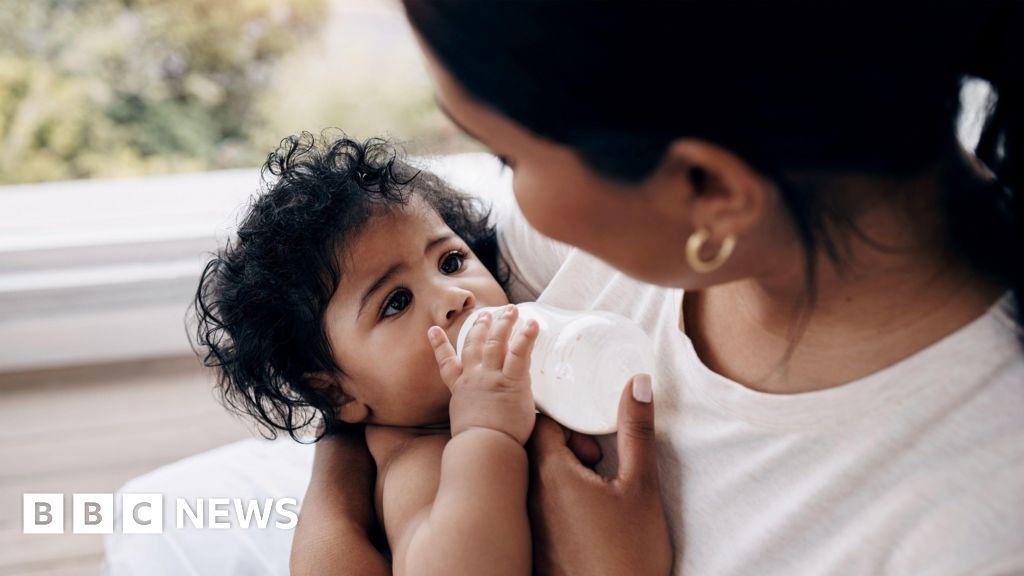BBC business reporter
 Getty Images
Getty ImagesParents should be allowed to buy baby milk in supermarkets using loyalty points and vouchers, the competition regulator has said following a probe into the market.
Restrictions on price promotions and discounts on formula should stay in place so mothers are not discouraged from breastfeeding, it said.
But people should be allowed to use points, gift cards and vouchers to get the most for their money, its chief executive told the BBC.
Parents could save up to £540 a year by switching between baby milk formula brands, it added.
Consumer campaign group Which? has compared different formulas, and says the core nutrients “are very similar”.
“Some baby-formula manufacturers increasingly market their product as superior in quality, or containing extra or special ingredients,” it said in its comparison.
“But such marketing claims should be treated with scepticism.
“This is because all infant formula sold in the UK is legally required to meet the same standards, so all will meet your baby’s nutritional needs – irrespective of brand, price or claims about ingredients.”
‘You go for the best you can’
Samantha Knaggs is a 35-year-old mum and home-maker in Hull.
She breastfed her previous two babies, but is giving her third formula milk because she is now on anti-convulsant medication.
Being able to use loyalty card points if she could choose which baby milk to go for would be “ideal” she said.
While the cost of baby milk doesn’t put pressure on her finances, she has known mothers who went to food banks to have enough money to buy formula.
If it had been made clear to her that all baby milk formulas provide the right nutrients for babies, she may have gone for a cheaper brand.
But part of the reason she uses the brand she chose is because it’s widely available, and has a bit of nervousness about giving her baby boy a different one, in case he has a reaction.
“You go for the best you can get when it’s your baby,” she said.
But she added that if all formulas have similar nutrients, they should be the same price.
TheCompetition & Markets Authority’s (CMA) key recommendations are:
- Parents should be able to use gift cards, vouchers, loyalty points and coupons instead of cash to buy formula
- Hospitals should give parents formula in plain packaging
- Parents should be given impartial advice that all baby formulas sold in the UK have the right nutrients for babies, including in supermarket labelling
It said prices should not be capped, as that would mean some parents would miss out on cheaper options.
Parents can feel guilty about using lower-priced brands, because they think they are somehow not as good, the regulator said, but babies get enough nutrients from lower-priced formulas.
The CMA compared various brands of formula, and found that the difference in prices over the first year of a baby’s life can hit parents in the pocket.
Buying current market leader, Aptamil, rather than Little Steps, which is one of the cheapest formulas, would cost parents £300 more per year, it said.
Buying the Aptamil premium brand, Aptamil Advanced, rather than Little Steps would cost £540 more.
At present the way the system is set up is not working well for parents, the CMA said.
One of its recommendations is that baby formula should have plain packaging in hospitals.
Baby milk brands often lose money on formula they give to the NHS, because they know that once parents start using a brand, they will buy it in a supermarket at a higher price.
But formula milks are tightly controlled by law, and must provide essential nutrients for babies, and be safe.
Plain packaging would break the link between the milk parents use in hospitals and what they buy afterwards, the regulator said.
The regulator also said supermarkets’ baby milk labels should let people know that all infant formula has the right nutrients for babies.
Retailers should also make it easier for parents to compare prices, and a ban on advertising should be extended to include follow-on formula.
Three companies – Danone, which makes Aptamil and Cow & Gate; Nestle, which makes SMA; and Kendamil – control more than 90% of the UK market.
Danone said that although all baby formulas must meet minimum regulatory requirements, “not all formula milks have the same nutritional benefits”.
Nestle said: “It is vital that families can make well-informed feeding decisions for their babies”.

